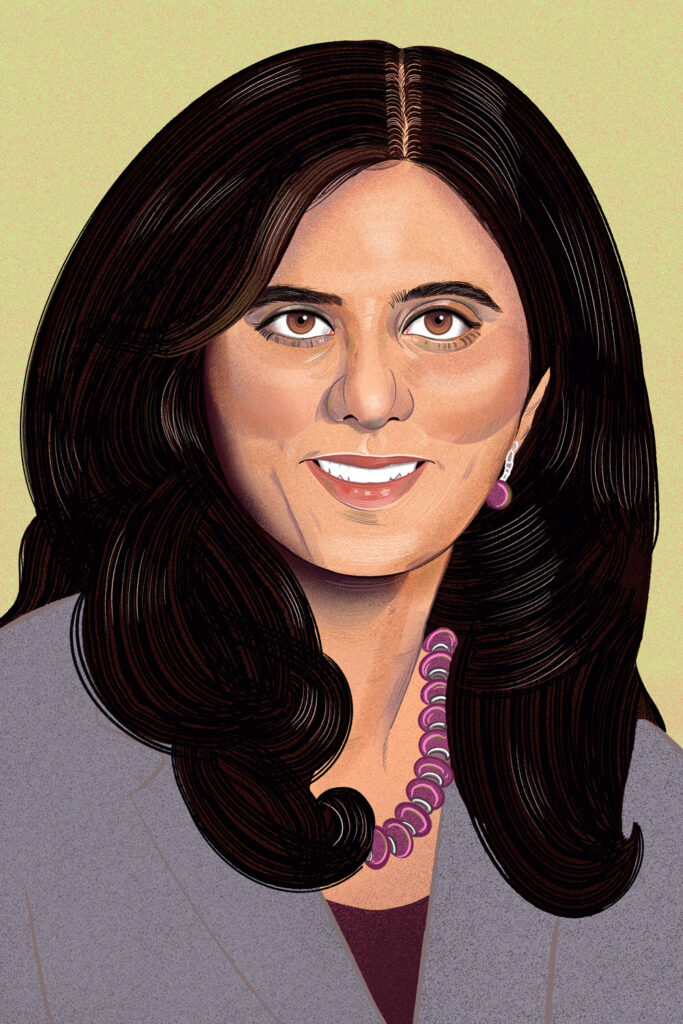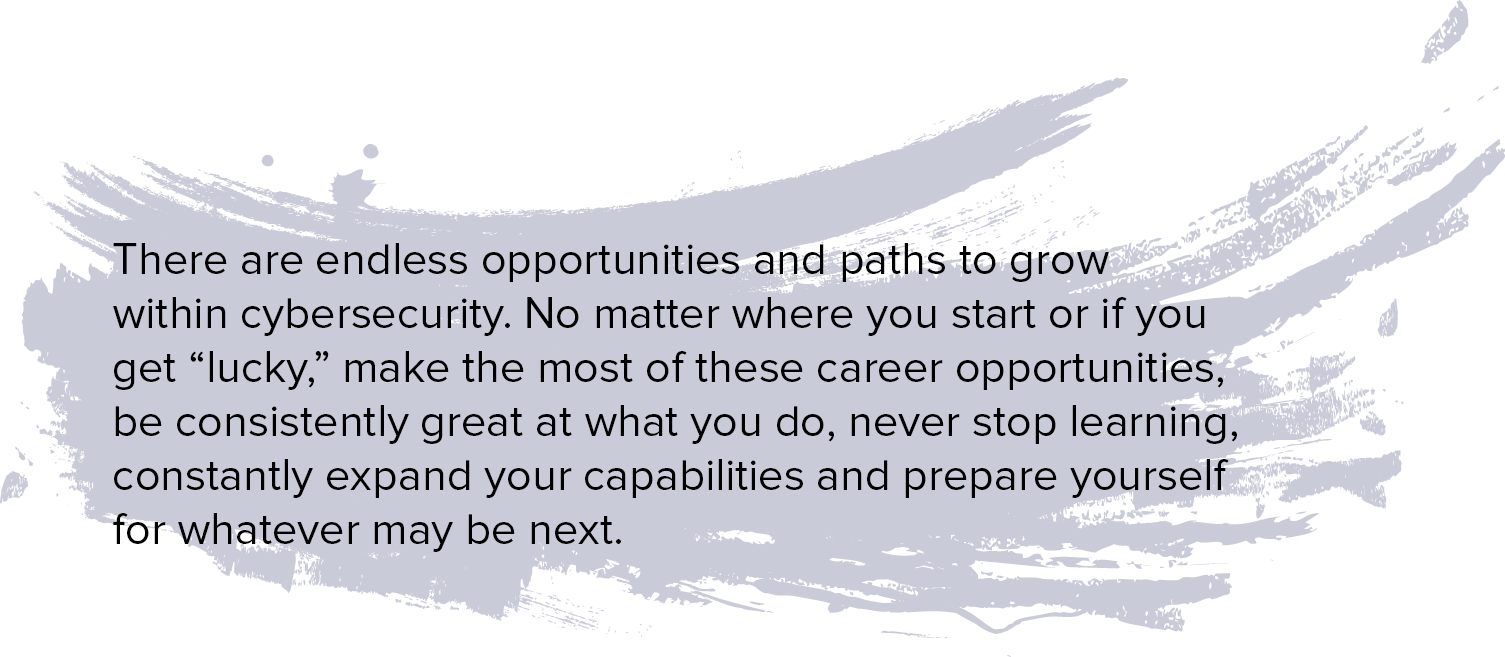Vijaya has broad experience leading engineering, product management, and information security at various B2B and B2C companies. Currently, Vijaya is Airbnb’s Chief Security Officer and Head of Engineering for Trust and Safety. Before that, as the Chief Development Officer, she led product development at Lookout, a SaaS startup. At FireEye, Vijaya served as SVP of Cloud Products & Engineering, building their SaaS offerings while transitioning the company’s on-premise business to the cloud. Before FireEye, Vijaya held multiple executive roles at Cisco, where she led engineering for a portfolio of security products with over $1B in annual revenue. Vijaya is an advisor for some of the leading VC firms.…
Vijaya won WeQual Awards America in 2022 in the Technology category, named one of the 100 Women in Tech to Watch in 2022, Top Revolutionary Women in Security 2019 and Top 25 Women in SaaS for 2018. Show more


LEADERS IN CYBERSECURITY
Vijaya Kaza
Chief Security Officer, Head of Engineering for Trust and Safety, Airbnb
What does a typical day of work look like for you?
In my current position, I have a dual role as Chief Security Officer and Head of Engineering for Trust and Safety. As the CSO, I oversee our Information Security program, which focuses on securing our internal assets. The Trust & Safety Engineering leadership role involves building the Trust platform and machine learning models to detect and reduce instances of fraud and abuse and to ensure the safety of users on our platform. My typical day might involve presentations to the board, driving strategy, solving customer challenges, coaching and guiding the teams and building relationships with key stakeholders. Of course, I am always recruiting or networking with potential candidates, along with staying connected with peers in the industry to keep up with the latest trends.
What aspects of your career journey have taken you by surprise?
In my career, I’ve worked in both the B2B and consumer space, for companies of various sizes, from small startups to large enterprises. I have been fortunate to experience diverse environments, which helped me develop a strong intuition to recognize problems and opportunities quickly. Despite the differences in the culture and stages of growth of these organizations, I found that many of the problems were universal. While the specifics vary depending on the context, the most challenging issues often boil down to human-related factors that would need human-oriented solutions. Yet, it is surprising that most organizations often overlook the human angle in favor of other complicated strategies.
Tell us about the cyber project you're most proud of working on in your career.
Over the years, I’ve had the privilege of leading several exciting projects with the support of world-class teams. It is tough to pick one project, so I will name a few. As part of a startup initiative at Cisco in the late 2000s, we built the Nextgen Firewall from concept to production, reimagining everything from architecture to UX. I am proud of the turnaround I accomplished as the head of engineering for a large business unit at Cisco and the transformation I later led at Lookout to scale product development. I am proud of the work we have done to take Airbnb public while enabling the sudden shift to remote work.
How has public perception of cybersecurity changed over the course of your career, and how do you predict in the future?
In recent years, cybersecurity has gone from a niche concern to a mainstream issue. Several headliner data breaches over the last decade and regulations like GDPR have led to this increased awareness, and the new SEC proposed regulations with stricter cybersecurity governance and disclosure requirements will make the public take an even greater interest in the topic going forward.
With the recent advances in AI and machine learning and the popularity of large language models (LLMs) and ChatGPT, the threat landscape has a new layer of complexity. It’s not just about protecting data anymore. We also need to worry about the potential for hacks and misuse of these algorithms. This will continue to be an important topic of debate and discussion in the coming years.
With the recent advances in AI and machine learning and the popularity of large language models (LLMs) and ChatGPT, the threat landscape has a new layer of complexity. It’s not just about protecting data anymore. We also need to worry about the potential for hacks and misuse of these algorithms. This will continue to be an important topic of debate and discussion in the coming years.
Tell us about your first job (can be anything!) and one lesson you might have learned from it.
When I first became a manager, I was responsible for recruiting, from finding the right candidates to closing them. Although the company and role were impressive, it was a highly competitive market, and candidates had multiple offers on the table. I realized that building a personal connection with each candidate during the recruiting process was the only way to win them over. This experience taught me a valuable lesson that has stayed with me throughout my career – that people join managers before they join companies. Likewise, they quit managers before they quit companies. This shaped my leadership approach of prioritizing building strong relationships with my team members and staying close to their needs.
What’s one piece of advice you’d give your younger self about getting started in cyber?
As one of my former CEOs used to say, “Luck comes to those who are prepared.” This is true whether we’re talking about individuals or organizations. People or companies that appear “lucky” or “to be in the right place at the right time” have worked very hard to position themselves that way.
Cybersecurity is a vast and dynamic field that keeps evolving alongside the latest trends like cloud computing, AI/ML, and crypto. There are endless opportunities and paths to grow within cybersecurity. No matter where you start or if you get “lucky,” make the most of these career opportunities, be consistently great at what you do, never stop learning, constantly expand your capabilities and prepare yourself for whatever may be next.
Cybersecurity is a vast and dynamic field that keeps evolving alongside the latest trends like cloud computing, AI/ML, and crypto. There are endless opportunities and paths to grow within cybersecurity. No matter where you start or if you get “lucky,” make the most of these career opportunities, be consistently great at what you do, never stop learning, constantly expand your capabilities and prepare yourself for whatever may be next.

Tell us about a role model or mentor who has helped shape your career.
I truly believe in the philosophy that everyone around you has something to teach you as long as you are open to learning. With that in mind, rather than talking about a single role model or mentor, I like to focus on specific traits and behaviors that I admire in people. At the top of the list are traits such as high integrity, clarity of thought and the ability to communicate those thoughts clearly. I also have a lot of respect for leaders who are extremely smart and can see the future but who are still humble enough to treat people around them with respect.
A meeting gets canceled and you have a surprise 30 minute window of free time — how do you spend it?
As much as I would like to say I use that time to take a relaxing walk in the woods, my answer is far less exciting. Like all of us, I have a long list of things waiting for my attention at any given time. Whether it is at an organizational or individual level, it is important to ruthlessly prioritize and manage how we spend our time, or else time will manage us.
I maintain a backlog of both my strategic and tactical priorities. This allows me to apply a thoughtful prioritization framework to them, with a similar discipline to how we treat business priorities or product backlog. When I find myself with unexpected free time, it’s a matter of referring back to this list.
I maintain a backlog of both my strategic and tactical priorities. This allows me to apply a thoughtful prioritization framework to them, with a similar discipline to how we treat business priorities or product backlog. When I find myself with unexpected free time, it’s a matter of referring back to this list.
What are the ways you stay grounded and take care of yourself?
Whenever I find myself dealing with a tough situation at work or in life, I try to remind myself of the countless people around the world who would give anything to trade places with me. It wasn’t too long ago that I was one of those people. Remembering this fills me with a deep appreciation for how far I’ve come, what I have today and the opportunities that lie ahead. This feeling of gratitude keeps me grounded and humble.
When you think about your personal legacy as a leader, what do you hope people will remember?
I hope that people will remember me as someone who exemplified the leadership traits I mentioned earlier. On a personal level, I hope people remember me as a good mentor that helped shape and impact their careers. On a business level, I hope to be remembered as someone that always focused on driving results and outcomes that continue to have a long-lasting impact.





